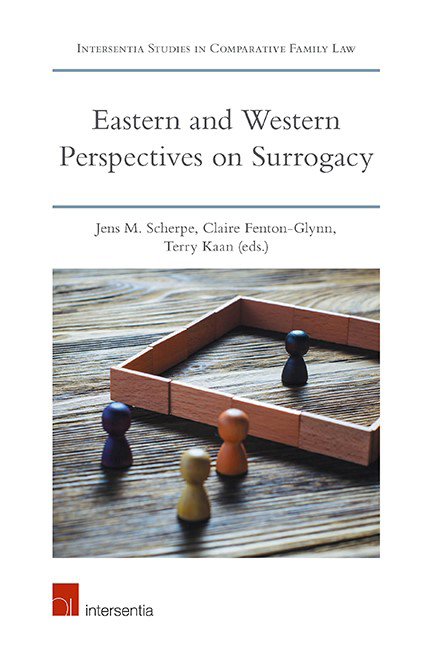Book contents
- Frontmatter
- Preface and Acknowledgements
- Contents
- List of Contributors
- Introduction
- Questionnaire
- PART I WESTERN PERSPECTIVES
- THE PROHIBITIVE APPROACH
- THE TOLERANT APPROACH
- THE REGULATORY APPROACH
- Greece
- Israel
- South Africa
- New Zealand
- Portugal
- Iceland
- THE FREE MARKET APPROACH
- THE INFLUENCE OF INTERNATIONAL COURTS
- PART II EASTERN PERSPECTIVES
- THE PROHIBITIVE APPROACH
- A TOLERANT APPROACH?
- REGULATION THROUGH PROFESSIONAL MEDICAL BODIES
- FROM FREE MARKET TO REGULATION
- PART III COMPARATIVE PERSPECTIVES ON SURROGACY
- Index
- About the Editors
Greece
from THE REGULATORY APPROACH
Published online by Cambridge University Press: 26 June 2019
- Frontmatter
- Preface and Acknowledgements
- Contents
- List of Contributors
- Introduction
- Questionnaire
- PART I WESTERN PERSPECTIVES
- THE PROHIBITIVE APPROACH
- THE TOLERANT APPROACH
- THE REGULATORY APPROACH
- Greece
- Israel
- South Africa
- New Zealand
- Portugal
- Iceland
- THE FREE MARKET APPROACH
- THE INFLUENCE OF INTERNATIONAL COURTS
- PART II EASTERN PERSPECTIVES
- THE PROHIBITIVE APPROACH
- A TOLERANT APPROACH?
- REGULATION THROUGH PROFESSIONAL MEDICAL BODIES
- FROM FREE MARKET TO REGULATION
- PART III COMPARATIVE PERSPECTIVES ON SURROGACY
- Index
- About the Editors
Summary
GENERAL LEGAL FRAMEWORK
The right to reproduce is guaranteed in Art. 5 para. 1 of the Greek Constitution, as an expression of the right to free development of one's personality. It covers not only natural but also medically assisted reproduction, both homologous and heterologous, and is further concretised though special legal provisions.
In 2002 a comprehensive law for medically assisted reproduction was enacted, that introduced a special chapter in the Greek Civil Code setting the conditions for medically assisted reproduction, while it also amended accordingly the rules on maternal and paternal descent. The regulatory framework on medically assisted reproduction was complemented three years later by a subsequent law on specific issues of the application of medically assisted reproduction methods, the donation of genetic material and its cryopreservation as well as on the establishment and operation of medical centres on assisted reproduction. The same law provided also for the foundation of the National Authority of Assisted Reproduction, which is an independent authority, the main responsibilities of which lie on the oversight of the implementation of the legal framework on medically assisted reproduction, the issue of regulations on special issues, as well as the submission of proposals for the amendment of the current provisions. In January 2017 the National Authority of Assisted Reproduction issued a Code of Ethics of medically assisted reproduction that includes a set of detailed binding rules on the applicable procedures.
The abovementioned legal framework includes explicit rules on surrogacy. Namely, gestational, but not traditional, surrogacy is permitted in Greece under specific conditions set by the law. Although the issue has been undoubtedly contentious, the legislator's decision to opt for the permissibility of surrogacy has been driven by pragmatic considerations: As mentioned in the Explanatory Memorandum of the law, a prohibition of surrogacy could never be enforced entirely. On this assumption, the regulation of surrogacy, rather than its prohibition, was thought to serve the best interests of the children that would be born using this method of assisted reproduction. Notwithstanding remote reactions from the Church, the relevant bill passed from the parliament with large majority.
- Type
- Chapter
- Information
- Eastern and Western Perspectives on Surrogacy , pp. 147 - 164Publisher: IntersentiaPrint publication year: 2019
- 2
- Cited by



